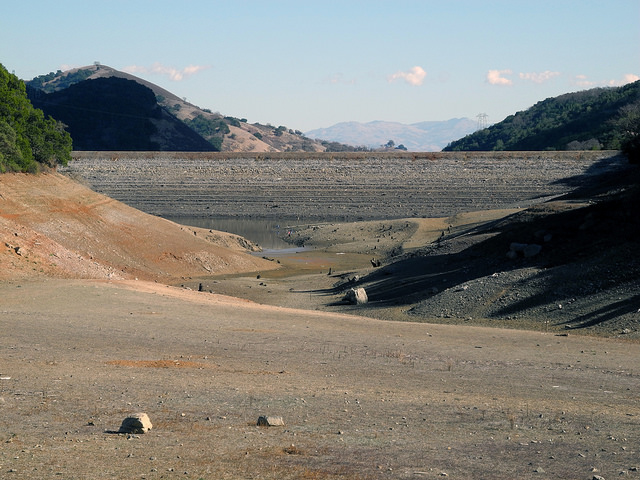California is running out of water. According to NASA scientist Jay Famiglietti, reservoir water is depleted down to a one-year supply, and “strategic backup supply, groundwater, is rapidly disappearing.”
Another American revolution is what is needed to handle the California water situation. As water shortages loom, the state is looking at a collapse of its social structure.
Stephen Hume of the Vancouver Sun writes British Columbia and Western Canada need to pay attention to their own water scarcity.
The response of California Governor Jerry Brown to the water crisis, which has been aggravated by four years of severe drought conditions, has been roundly criticized.
Brown has imposed mandatory cuts of 25 per cent on domestic water. Local water authorities are supposed to work out how water use will be curtailed. Importantly, agricultural users, fracking operators, and oil companies were not subject to immediate administrative action. Consultations and new plans take time.
Finding and delivering clean water to households and removing dirty water is an essential part of modern society. Each of us require between four and five litres of water per day for personal use.
Delivering household water at low cost is a long-standing public policy objective; now California municipal authorities will try to get people to stop watering lawns to deal with the shortage. But what happens after that?
Deciding who gets water is a political question. It has a market economics answer: price water so that users pay the real costs of using it.
It is possible to identify what is basic to society and what is not, and to allow market prices to prevail for non-essentials. Water metres can track industrial and agricultural consumption, and water prices can be calibrated according to use, with prices rising steeply as use increases.
California irrigates agricultural land to produce rice. Unless producers pay for the full costs of the water, it is impossible to know what people are paying for California rice. Transport and delivery cost for water are easy enough to calculate. But pricing an essential commodity in short supply is not so clear cut.
Market pricing has limitations. Wealthy people can pay extra, poorer people suffer when they have to pay steeper amounts for basic necessities. In B.C., after taking water without paying for it, Nestlé has negotiated a sweetheart price of $2.35 per million litres or $596.25 a year for 265 million litres. Virtually free water: corporate power at work.
Climate change and drought have depleted the supply of water in California. With supply limited, but more houses, more people, and more agro-industrial uses for water, market-priced water needs a steep trend upwards. But it does not matter how expensive water gets, higher prices cannot alter climate-dependent supplies.
Take a step back from the household, farm or industrial perspective, and the California situation takes on dimensions missed by the market-pricing answer to water shortage.
Drought and climate change are a result of the energy-intensive, fossil-fuel burning “American Way of Life.”
California has 32 million vehicles on the road. With a population of below 40 million, the state alone ranks as the seventh largest economy in the world.
Californians, like all Americans, are big meat eaters, carnivores. Top scientific research linking climate change and water use suggests that raising animals in order to eat them is the most direct lifestyle threat to the environment.
Nearly one-half of the water used in the U.S. goes to raising livestock for food. The Animal Rights organization PETA points out that it takes “2,400 gallons of water to produce 1 pound of meat, while growing 1 pound of wheat only requires 25 gallons. You save more water by not eating a pound of meat than you do by not showering for six months!”
Nearly a decade ago the FAO reported: “the livestock sector generates more greenhouse gas emissions as measured in CO2 equivalent — 18 percent — than transport.” Raising cattle is more dangerous to climate than driving cars and air travel.
A New York Times report finds optimism reigns in California even as continued drought means water taps are going dry.
When Governor Brown is thinking up personal advice to Californians on how to deal with the collapsing water reserves, he can suggest people give up meat consumption entirely, or curtail it drastically.
Pessimists will respond that diet is so personal that virtually nothing you can say to anybody will get them to change their eating habits.
The reality is that changing from a meat-based diet to a plant-based diet is the single most significant environmental action that could be taken in California, the U.S., Canada, or the industrialized world.
If not another American revolution, what about a new War of Independence — from meat-eating?
Duncan Cameron is the president of rabble.ca and writes a weekly column on politics and current affairs.
Photo: Ian Abbott/flickr



